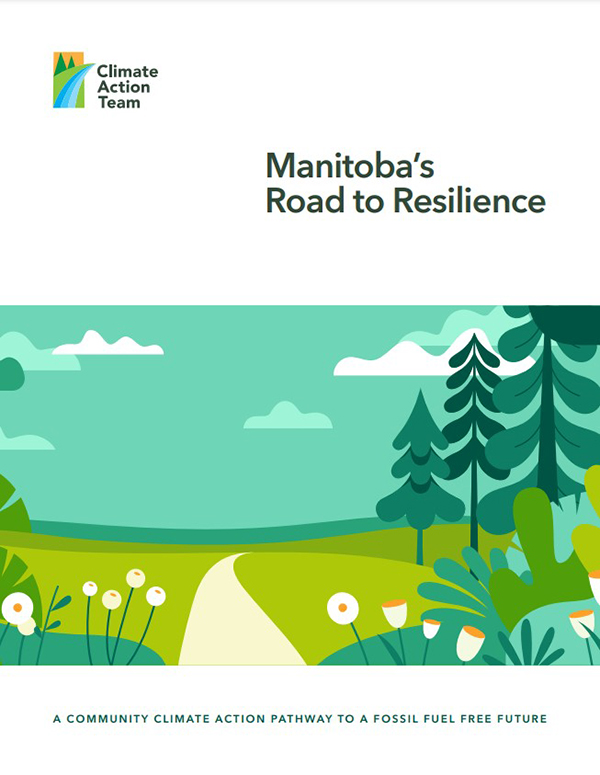Building climate-resilient communities with the Climate Action Team.
While summer 2021 will be remembered as a time when we began hugging our friends and families again after the isolation of a global pandemic, it will also be remembered as a hot, dry and hazy summer, with record heatwaves, forest fires and droughts across Canada – all products of the global climate crisis.
There is no doubt we feel the impacts of climate change in our province, and Manitoba’s Climate Action Team (CAT), a coalition of partner organizations, is actively working to reduce the impact and build resilience. See member organization list, below – Who is involved with CAT?
“Building resilience is about meeting our basic needs – feeding ourselves, heating our buildings and moving goods and people – all without the use of fossil fuels,” says Curt Hull, lead author of CAT’s new report, Road to Resilience: A Community Climate Action Pathway for a Fossil-Fuel Free Future.
“We need to use electricity and energy efficiently. People need to be aware of the solutions and work passionately towards them,” Hull says.
The report was developed as a part of a larger Road to Resilience program, designed to engage and educate Manitobans on practical steps towards meeting net zero Green House Gas (GHG) emission targets. It was inspired by the urgency for action expressed by the United Nations Intergovernmental Panel on Climate Change (IPCC), which in 2018 said we have 12 years to limit the catastrophe that will be caused by climate change. In 2021, the IPCC issued an updated “reality check” that explains some of the environmental changes already seen, will be irreversible for hundreds to thousands of years, but “strong and sustained” reductions in emissions of carbon dioxide (CO2) and other GHGs can limit climate change.

Road to Resilience was launched in 2019 and has received support from The Foundation. The first phase included a series of public engagement events, and the research and development of the report.
An additional grant recently supported phase two of the project – the development of tools and resources related to key themes of the community action plan. The themes identified include technical ones, such as buildings, transportation, food and agriculture, energy and electricity; along with foundational themes, including human impacts, the economy and green jobs, and natural spaces.
“Our next step on the road to resilience is to connect with communities, build awareness through climate change workshops, help communities identify their priorities using the key themes as a starting point, and make a plan,” says Dr. Durdana Islam, program manager CAT. “People are interested and hungry for this kind of knowledge.”
CAT is planning to connect with 10 communities – five non-Indigenous and five Indigenous communities in Manitoba – and is working with the Centre for Indigenous Environmental Resources.
“It’s not up to [CAT] to tell people what to do. Our job is to connect with people and communities and work together to figure out what actions we can collectively take,” Islam says.
The second phase of Road to Resilience also includes quantifying the solutions behind the key themes and is being supported by Environment and Climate Change Canada.
“Take for example the technical themes of buildings and transportation,” Hull explains. “The demand for electricity to heat our buildings and electrify our vehicles far exceeds supply. To make a workable solution, we need to make sure we use our energy efficiently. We need buildings that are much better insulated and heated with geothermal. We need to develop new renewable energy sources, like solar panels. And we need to store energy in big batteries in our buildings and houses. This next step of our project will really show the way to solve these big challenges.”
For more information, visit: climateactionmb.ca
Recipient: Green Action Centre, on behalf of Manitoba’s Climate Action Team
Program: Road to Resilience
Grant: $156,000 total since 2019, drawn from the GMacDonald Family Endowment Fund, The Winnipeg Foundation Environment Fund, and the hundreds of Community Building Funds
Who is involved with CAT?
The Climate Action Team (CAT) is made up of five local environment and policy groups, including:
- Green Action Centre
- Climate Change Connection
- Wilderness Committee
- Manitoba Energy Justice Coalition
- Canadian Centre for Policy Alternatives
It also works closely with several allied groups.
Climate resilience starts with you and me
The Winnipeg Foundation reviews sustainability practices to help combat the climate crisis
Taking action on the climate crisis begins by taking stock of individual and collective behaviours. Green Action Centre’s Sustainability and Waste Management Audits aim to help people and organizations understand how they are doing and what they can do to improve, so we can build climate crisis resilience.
The Winnipeg Foundation’s staff participated in a Sustainability and Waste Management Audit in spring 2021. Led by Green Action Centre’s Sustainability Projects Coordinator, Josep Seras Gubert, staff participated in informative sessions and creative workshops and learned how consumption, transportation and food waste contribute to Green House Gas (GHG) emissions.
“Sharing knowledge is key in sparking motivation,” Seras Gubert says. “Climate change is big and global and overwhelming – but understanding all the smaller pieces and how it all fits in the bigger picture helps make them actionable. Collective action needs to be part of the strategies and DNA of an organization. That’s how we can make an impact.”
The creative workshops inspired ideas about collective and concrete actions we as citizens and staff members can take on reducing our footprint and building resilience to the climate crisis. The Foundation will make adjustments based on the recommendations.
The Foundation was inspired to do the audit after the success of a recent pilot project that worked with youth-serving organizations. In spring 2020, The Foundation supported environmental audits for Youth
Agencies Alliance (YAA) member organizations Art City, Rossbrook House and the Boys and Girls Club. These three organizations participated in audits of their space and habits, and each received a $60,000 grant to upgrade their spaces and learn strategies to become climate resilient.
All of YAA’s 15 member organizations later participated in the audits. While most organizations face capital upgrade challenges because they don’t own their office space, The Foundation is pleased to support waste management and composting initiatives for each agency, in an effort to form sustainability habits early.
This story is featured in the Fall 2021 issue of our Working Together magazine. Download or view the full issue on our Publications page.



 Environment & Animal Welfare
Environment & Animal Welfare